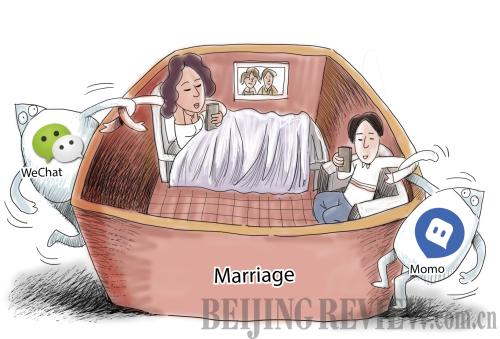
(LI SHIGONG)
Union crossroads
Unlike most young couples who tend to end their marriage on impulse, most middle-aged divorce seekers, who are burdened with many responsibilities, choose to sever their ties after serious deliberation.
In recent years, a large number of couples have ended their marriages after their children took the national college entrance exam in June, also known as the gaokao. As a result, the divorce rate usually peaks from June to September. Zhou Hao, a lawyer in Wuhan, central China's Hubei Province, said that among all the 30 divorce cases she handled after the gaokao this year, more than 20 involved couples whose children had just took part in the exam.
A couple in Wuhan reportedly signed their divorce agreement five years ago but had to fake their relationship for their daughter because they didn't want family troubles to hinder her performance on the exam.
Statistics based on divorce records in a third of China's provincial-level regions show that more divorce cases were filed in courts in the 20 days after the gaokao than in the 20 days before it since 2009.
In Changsha, capital of central China's Hunan Province, nearly 500 couples filed for a divorce in the first week after this year's gaokao, a number that nearly doubled that in the previous week, reported the Changsha-based newspaper Sanxiang Metro.
Jin Hui (pseudonym), a 43-year-old woman in Jinan, east China's Shandong Province, divorced her husband right after the score of their daughter in the gaokao was released.
"We had both worked in a county in the vicinity of Jinan. But in 2005, he quit the job and came to Jinan to start his own business," Jin said. "He soon made a lot of money, but the accumulation of wealth also made a gap between us. He has new social connections with whom I can't be involved. I know we can't go back to where we were."
In front of their daughter, though, they pretended to be happy and intimate. "It was torture for both of us," Jin admitted. "So we decided to give up and set each other free."
Normally, many middle-aged couples choose to end their marriage because of the change of wealth and/or social status of one party.
"But it is not an irreconcilable conflict. Many people just don't want to take actions to better the situation," Sun said. "They are, by and large, tired of the long marriage."
Statistics released by the MCA also reveal that extramarital affairs are spotted in 74.6 percent of all divorce cases. Sixty percent of people surveyed have been cheated on by their spouses, either physically or mentally.
The boom of social networking platforms has been blamed for catalyzing cheating in recent years. Extramarital affairs in which social networking apps such as WeChat and Momo have played a role increased 20 percent in 2014. Currently, WeChat has 468 million active users per month and the less popular Momo boasts 100 million users.
"It has never been so easy to reach out to strangers," said Wang Lulu, a Beijing resident, who admitted that she felt nervous about her marriage after she found out that her husband was chatting with a woman on Momo. "He said that it is just chatting, nothing else, but I know it is not that simple. Every time his smartphone buzzes, I feel bad."
Xie Lin (pseudonym), a housewife taking care of a 3-year-old son at home, always feels bored, and chatting with random people encountered on social networking apps is the only thing she has to pass the time. "But I will definitely hide this from my husband," Xie said.
Besides all the reasons above, a unique factor that has increased the divorce rate mentioned in the report of the MCA has nothing to do with love.
In 2013, tight housing purchase restrictions were implemented in major Chinese cities to curb soaring property prices. The new policy charges an extra 20-percent income tax if a couple with two homes wants to sell one. However, if the couple was to get divorced, each ex could then register a house in their respective names, meaning that if either house was to be sold, no extra tax would be incurred.
The initial purpose of the policy was to cool down the torrid real estate market, but within days after the new policy took effect, a lot of cities reported a rise in divorce applications, as pragmatism continues to win out over romance in China. In most housing-related divorce cases, divorced couples remarried after the transaction was complete.
"Any policy that leads to something this dramatic is defective," said Minister of Finance Lou Jiwei at a press conference in March 2014.


















































